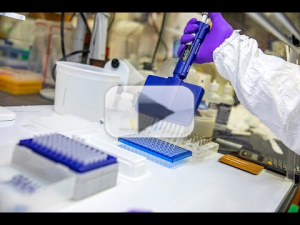The nation’s coronavirus task force announced clinical trial results for remdesivir, a treatment from Gilead Sciences that emerged as a possible coronavirus treatment in the lab of Ralph Baric, PhD.

UNC-Chapel Hill researchers led by Ralph Baric, PhD, the William Kenan Distinguished Professor of Epidemiology at the UNC Gillings School of Global Public Health, led preclinical testing of a broad-spectrum antiviral drug called remdesivir this spring. And now the nation’s coronavirus task force has announced clinical trial results for remdesivir used to treat individuals with COVID-19.
The treatment diminished the time to recovery from COVID-19, the disease caused by the virus SARS-CoV-2. Testing at the lab of Ralph Baric, holds a joint faculty appointment in the UNC Department of Microbiology and Immunology at the UNC School of Medicine, set the stage for clinical trials as the virus spread across the globe.
The intravenous drug remdesivir could provide relief during a global pandemic that has taken the lives of more than 200,000 people and infected more than 2 million around the world.
As of now, there is no FDA approved drug on the market to prevent any human coronavirus or treat associated diseases like COVID-19. “So, basically we have no weapons in our arsenal,” said Tim Sheahan, a virologist in Baric’s lab.
Remdesivir could be the first anti-viral medication in our arsenal.
Six years ago, the Baric lab partnered with the biopharmaceutical company Gilead Sciences Inc. Their goal was to test the company’s antiviral drugs to curb emerging viral diseases often overlooked by big pharmaceutical companies, said Sheahan.
Coronaviruses were of particular interest.
Fast forward to today, and the intravenous drug remdesivir could potentially be a relief to this global pandemic. Just like broad-spectrum antibiotics — which can cure a wide range of bacterial infections — a broad-spectrum antiviral like remdesivir can work against genetically distinct viruses.
In animal and cell models of SAR and MERS coronavirus diseases, researchers have prevented infection and also diminished associated diseases during an ongoing infection. Sheahan said the drug has worked against every coronavirus they’ve tested so far, including the one that causes COVID-19.
Not long ago, remdesivir was a hopeful solution to the 2018 Ebola outbreak. The drug was successful against the virus in the lab, but not in patients. It’s important to note, however, that Ebola is not a coronavirus.
If successful as a COVID-19 treatment, though, remdesivir could not only save lives of those affected with this coronavirus but also ones we have yet to face.